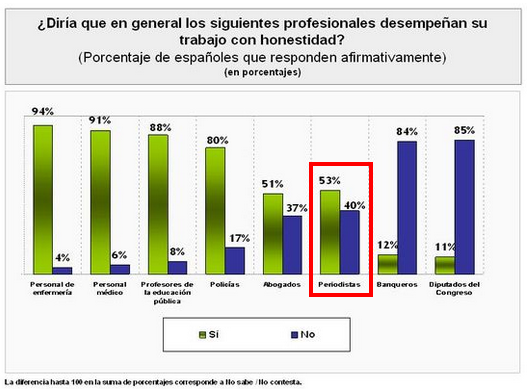
Jean-Marie Charon explores the relationships linking journalists to their audience: a compulsory facet of contemporary deeply emblematic of a society of mistrust in which the public space is immersed. Anyone who has participated in any of the numerous debates organized on the issue of media has also witnessed an emotional violence that everyone usually manifests (popular, cultivated, young and old, and so on) against the public information system. This attitude has been clearly identified by a series of polls that since 1987, the measure of confidence given to those who produce the information. The main conclusion is that such confidence is weak and continues to deteriorate.
Journalists are accused of many evils. To polarize themselves around issues far removed from the concerns of the people. To encroach on privacy even at the risk of harming people. To manufacture an "almost" without bothering to verify it. Mixing facts and comments. Proposing a hierarchy of information without reasonable links to the importance of subjects, such as launching various facts as id they were leading-edge products. And above all, they are suspected of being subject to political influence and more recently, in the domain of financial groups.
Jean-Marie Charon serenely describes the complaints made by the public relating to the media and tries to describe, siding with journalists and the information producers, the reasons for this disaffection.
The key lies in a misunderstanding, he says, in the unfulfilled expectations of the public. They want reliable information of quality, information with "zero defects". "The public, or a significant part of it, demand that the media and journalists produce knowledge." Meanwhile, journalists complain about their working conditions (urgency, material resources, competitive bidding) greatly limit such a desire. The demands of the public "forget" the essentially unfinished and random character of breaking news. "Current affairs information is by definition an outlet at any given moment, a situation that has burst out suddenly, without having captured its deeper deep sense, and even less its evolution over time.
Information is fragile material
In other words, information is a fragile matter, evolutionary and generally relative... by its very nature. Following in the wake of a resolution on the ethics of journalists adopted in 1993 by the Parliamentary Assembly of the Council of Europe, the National Advisory Commission on human rights (1995) and the Economic and Social Council (1999), the recommendations multiplied. The first, aimed at ensuring a high level of training of journalists: the creation of the Po School of Journalism of Science, which was based on this argument. The second proposed the establishment of a code of conduct that would define best practices. In fact, the profession is framed by long agreements, in particular the Charter of Munich, and also by a set of texts adopted by newsrooms or press companies.







